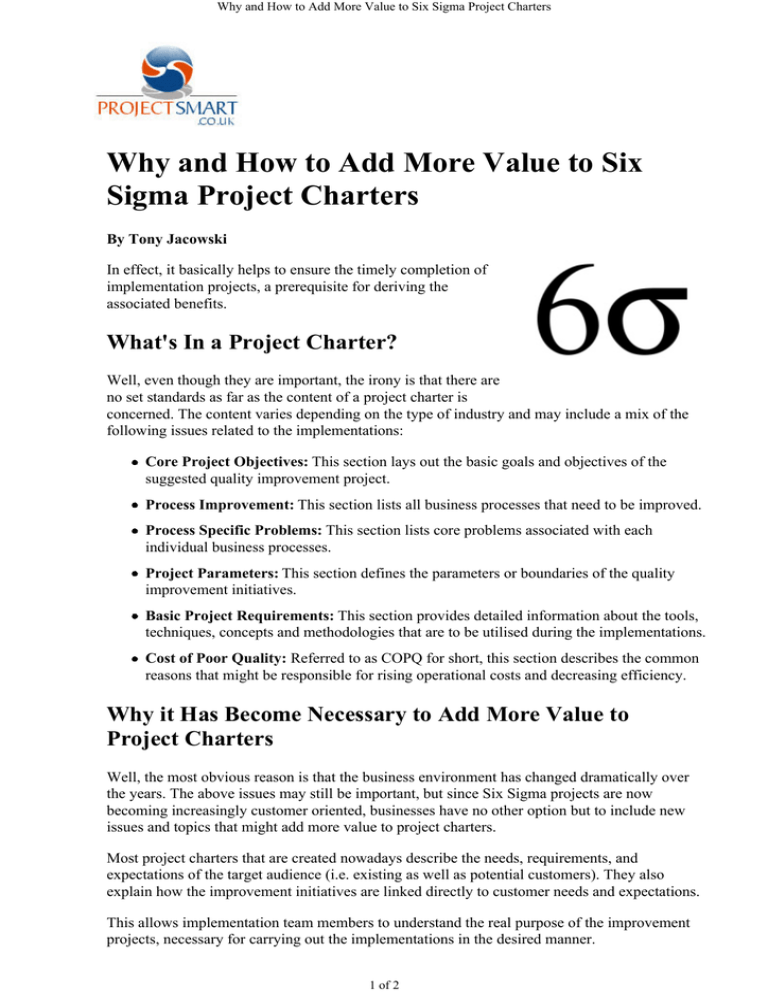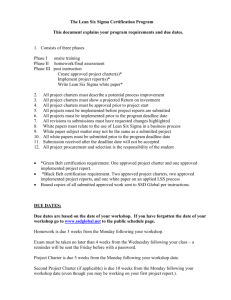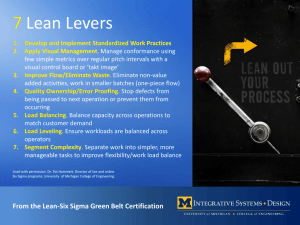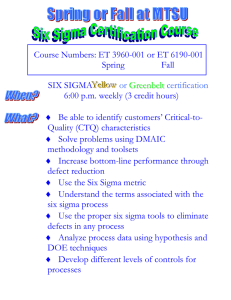Why and How to Add More Value to Six
advertisement

Why and How to Add More Value to Six Sigma Project Charters Why and How to Add More Value to Six Sigma Project Charters By Tony Jacowski In effect, it basically helps to ensure the timely completion of implementation projects, a prerequisite for deriving the associated benefits. What's In a Project Charter? Well, even though they are important, the irony is that there are no set standards as far as the content of a project charter is concerned. The content varies depending on the type of industry and may include a mix of the following issues related to the implementations: Core Project Objectives: This section lays out the basic goals and objectives of the suggested quality improvement project. Process Improvement: This section lists all business processes that need to be improved. Process Specific Problems: This section lists core problems associated with each individual business processes. Project Parameters: This section defines the parameters or boundaries of the quality improvement initiatives. Basic Project Requirements: This section provides detailed information about the tools, techniques, concepts and methodologies that are to be utilised during the implementations. Cost of Poor Quality: Referred to as COPQ for short, this section describes the common reasons that might be responsible for rising operational costs and decreasing efficiency. Why it Has Become Necessary to Add More Value to Project Charters Well, the most obvious reason is that the business environment has changed dramatically over the years. The above issues may still be important, but since Six Sigma projects are now becoming increasingly customer oriented, businesses have no other option but to include new issues and topics that might add more value to project charters. Most project charters that are created nowadays describe the needs, requirements, and expectations of the target audience (i.e. existing as well as potential customers). They also explain how the improvement initiatives are linked directly to customer needs and expectations. This allows implementation team members to understand the real purpose of the improvement projects, necessary for carrying out the implementations in the desired manner. 1 of 2 Why and How to Add More Value to Six Sigma Project Charters How to Add More Value to Project Charters Well, the first thing that businesses need to do is identify the exact needs and requirements of the target audience. Here, businesses need to be very specific because if needs are defined in terms such as "better quality" or "low price," it's highly unlikely that the project will achieve any real results. What actually needs to be done is quantify the needs and requirements into measurable terms such as "a 20 percent improvement in product or service quality" or "a 20 percent reduction in the list price." Such quantification will make the basic project objectives quite clear to the implementation team members, something that will pave the way for the project's successful completion. However, businesses should never forget that project charters act as the blueprint and that even small mistakes can lead to serious problems during implementations. For best results, it is recommended that businesses go slow and take the necessary precautions while adding new content or value to Six Sigma project charters. Tony Jacowski is a quality analyst for The MBA Journal. Aveta Solutions - Six Sigma Online www.sixsigmaonline.org offers online Six Sigma training and certification classes for lean Six Sigma, black belts, green belts, and yellow belts. © Project Smart 2000-2008. All rights reserved. 2 of 2






